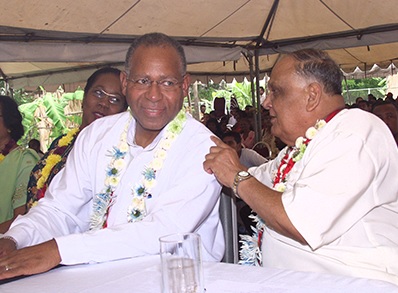(Trinidad Guardian) General secretary of the Sanatan Dharma Maha Sabha (SDMS), Sat Maharaj, yesterday launched an extraordinary verbal attack on former prime minister Patrick Manning, describing him as a “racist.”
In a harsh assessment totally out of step with laudatory ones heaped on Manning in the week between his death and his burial, Maharaj said he and several members of the public came to that conclusion on a talk show programme on Radio Jaagriti on Tuesday, based on a series of discriminatory practices Manning perpetuated against Indians in T&T while he served as PM.
In retrospect, Maharaj said he felt “hurt” that many of Manning’s actions were “racist”, unfair and biased against a number of Indians in the country.
“I only spoke about the facts. What I spoke about was his performance as prime minister. I started off by discussing the many discriminatory things he did. As prime minister he acted in a discriminatory manner,” Maharaj said in a telephone interview.
Manning, 69, died on July 2 at the San Fernando General Hospital. He had been hospitalised for a lung infection but was subsequently diagnosed with acute myeloid leukaemia, a rare, aggressive cancer of the blood.
The closure of Caroni 1975 Ltd, whose employees were mostly Indians, Maharaj said was one decision Manning made that crippled the lives of thousands of struggling Indians.
“We are now importing sugar while Barbados and Guyana have sugar industries,” he said.
Maharaj said Manning’s attempt to have Sat Sharma removed as Chief Justice for misbehaviour in public office and for having a limited state of emergency around the home of then House Speaker Occah Seapaul were unforgettable instances.
In 2007, Sharma found himself in trouble when he was accused by then Director of Public Prosecutions, Geoffrey Henderson, of attempting to persuade him to drop a murder charge against vascular surgeon Dr Vijay Naraynsingh in 2004.
“He is the first prime minister in the Commonwealth to try to arrest a chief justice.
“He is also the first PM to call a state of emergency so that Seepaul could not preside as a presiding officer and have a cast in vote. He is the only man in the Commonwealth who appointed his wife as a minister in the Cabinet,” Maharaj said.
He drew reference to public servant, Feroza Ramjohn, who instituted legal action in seeking justice for lack of promotional opportunities.
“I could still remember Manning describing Petrotrin as petrosingh because there were too many Indians working there,” Maharaj said.
He said while PNM stalwart and businessman, Louis Lee Sing, had acquired his radio licence with ease “we had to go the Privy Council to get our radio and television licences. We had to threaten them with contempt of court. That was another case of discrimination.”
Church in Guanapo
Maharaj said the fact that Manning started building a multi-million dollar church in Guanapo, Arima, for himself and one-time spiritual adviser Juliana Pena was also discriminatory.
“Not only he built a church for the Christians but he also established the Divine Echoes Orchestra, which was a Christian-oriented music group.”
In 1992, Maharaj said Manning ordered a study by Dr Selwyn Ryan and Dr John La Guerre, which showed that few Indo-Trinidadians were promoted to senior posts in the public service.
“I read what they said about recruitment in the Police Service… that the Indians top when it comes to the written examination but they failed when they did the interview stage. They pointed to the fact that everybody on the interview panel were Afro Trinidadians.
Few grants for Indian events

When asked why he did not raise these matters publicly when Manning was alive, Maharaj said:
“No! I have been raising these issues all the time. We wrote articles about him. We raised it in the courts too.
“But you see now that he is dead they are trying to make him into some idol. Everybody is painting him as a paragon of virtue… they are ignoring the other side of him.
“They are trying to paint him as some kind of father of the nation when in actual fact he was not. We want to point out the bad side of him.”
Maharaj said many callers concurred with him that what Manning did was discriminatory and wrong. Didn’t the SDMS benefit under Manning’s administration?
“In what way? If you talking about benefits then we are talking about equality. Yes, we benefit… we can use the roads if it is paved,” he answered.
Questioned if the SDMS was the recipient of grants under Manning’s regime for Divali, Phagwa and other religious events, Maharaj said they received “very little grants.”
Told he could face stinging condemnation and backlash for his criticisms against Manning, Maharaj said: “I said it. I don’t care about the backlash.” He said he shared a cordial relationship with Manning and had in fact pointed out to him where he had gone wrong as PM.
Forde response
General secretary of the People’s National Movement Ashton Forde last night expressed astonishment at Maharaj’s comments.
“Any one body who is saying that about Mr Manning is not living in Trinidad and Tobago. They are trying to re-write history”, Forde told the T&T Guardian.
Forde said Manning followed in the footsteps of two great prime ministers- the late Dr Eric Williams and George Chambers’ in ensuring there was equity in the governance of the country.
“Many of the country’s high commissioners, Cabinet ministers and directors on State boards who served under Mr Manning were Indian. Mr Manning embraced all races. He did not discriminate at all. I knew him personally. He was a fair man.”
Forde said people who were appointed under the People’s Partnership government also credited Manning for his work and fairplay.





